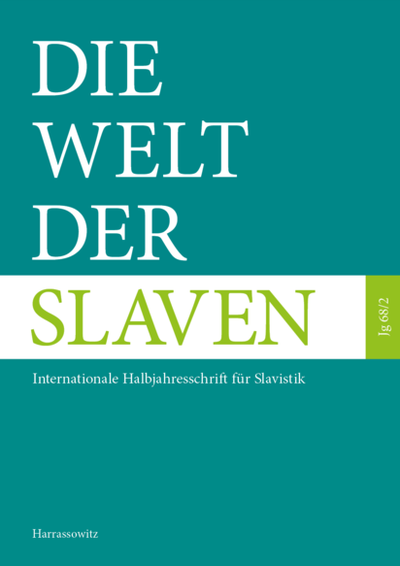Pathos, Schock, Trauma
Psychologische Konzepte in einigen Poetiken der Avantgarde (Ėjzenštejn, Warburg, Benjamin)
DOI:
https://doi.org/10.13173/WS.68.2.394Schlagwörter:
avant-garde, poetics, experimental aesthetics, mnemeAbstract
Pathos, shock, trauma: Psychological concepts in certain poetics of the avant-garde (Ėjzenštejn, Warburg, Benjamin)
The present article aims at conceptualizing the relationship between availability and unavailability of poetic and aesthetic means of expression in the production of avant-garde art. This relationship will be introduced and analysed based on the three title terms: pathos, shock, trauma. As it seems, the avant-garde was characterized by a fundamental ambivalence: On the one hand, it was inscribed in the empowerment discourse of Modernity and believed that it could also control the conditions of its own art production. On the other hand, it was the avant-garde in particular that emphasized the independent potentiality of the material itself, which was removed from the artist’s control and could nonetheless make a decisive contribution to the creative process. This ambivalence between the total subjugation of the material to the artist’s will to form and the potentiality of the resisting material or the fundamental unavailability of art’s own conditions will be examined on the basis of three representatives of the avant-garde: Sergej Ėjzenštejn, Aby Warburg, and Walter Benjamin.
Literaturhinweise
Benjamin, Walter. 2015. Über einige Motive bei Baudelaire. In ders., Ausgewählte Werke, Bd. 1, 541–591. Darmstadt.
Bohn, Anna. 2003. Film und Macht: Zur Kunsttheorie Sergej M. Eisensteins 1930–1948. München.
Ėjzenštejn, Sergej. 1974. Montage der Attraktionen. In ders., Schriften, Bd. 1, 216–221. München.
Ėjzenštejn, Sergej. 1984. Separator und Gralskelch. In ders., Schriften, Bd. 4, 194–218. München.
Ėjzenštejn, Sergej. 2002a. Magija iskusstva. In ders., Metod, Bd. 1, 46–47. Moskva.
Ėjzenštejn, Sergej. 2002b. Montaž atrakcionov. In ders., Metod, Bd. 1, 49–63. Moskva.
Ėjzenštejn, Sergej. 2002c. Vychod iz krizisa. In ders., Metod, Bd. 1, 129–139. Moskva.
Ėjzenštejn, Sergej. 2006. Separator i čаšа Graalja. In ders., Neravnodušnaja priroda, Bd. 2, 47–73. Moskva.
Emerson, Caryl. 2005. Shklovsky’s ostranenie, Bakhtin’s vnenakhodimost’ (How distance serves an aesthetics of arousal differentely from an aesthetics based on pain). Poetics Today 26(4). 637–664.
Gombrich, Ernst. 1970. Aby Warburg, an intellectual biography. London.
Jampolʹskij, Michail. 2006. Različie, ili Po tu storonu predmetnosti (Ėstetika Gejne v teorii Tynjanova). NLO 80 (= 4/2006), 30–54.
Lévy-Bruhl, Lucien. 1921. Das Denken der Naturvölker. Wien.
Rancière, Jacques. 2008. Die Aufteilung des Sinnlichen: Die Politik der Kunst und ihre Paradoxien. Berlin.
Rieger, Stefan. 1998. Richard Semon und/oder Aby Warburg: Mneme und/oder Mnemosyne. In Assmann, Aleida & Weinberg, Manfred & Windisch, Martin (Hg.), Medien des Gedächtnisses, 245–264. Stuttgart.
Sasse, Sylvia. 2009. Pathos und Antipathos: Pathosformeln bei Sergej Ėjzenštejn und Aby Warburg. In Zumbusch, Cornelia (Hg.), Transformationen des Pathos, 171–190. Berlin.
Semon, Richard. 1904. Die Mneme als erhaltendes Prinzip im Wechsel des organischen Geschehens. Leipzig.
Warburg, Aby. 1992. Dürer und die italienische Antike. In ders., Ausgewählte Schriften und Würdigungen, 125–130. Baden-Baden.
Zumbusch, Cornelia. 2004. Wissenschaft in Bildern: Symbol und dialektisches Bild in Aby Warburgs Mnemosyne-Atlas und Walter Benjamins Passagen-Werk. Berlin.

